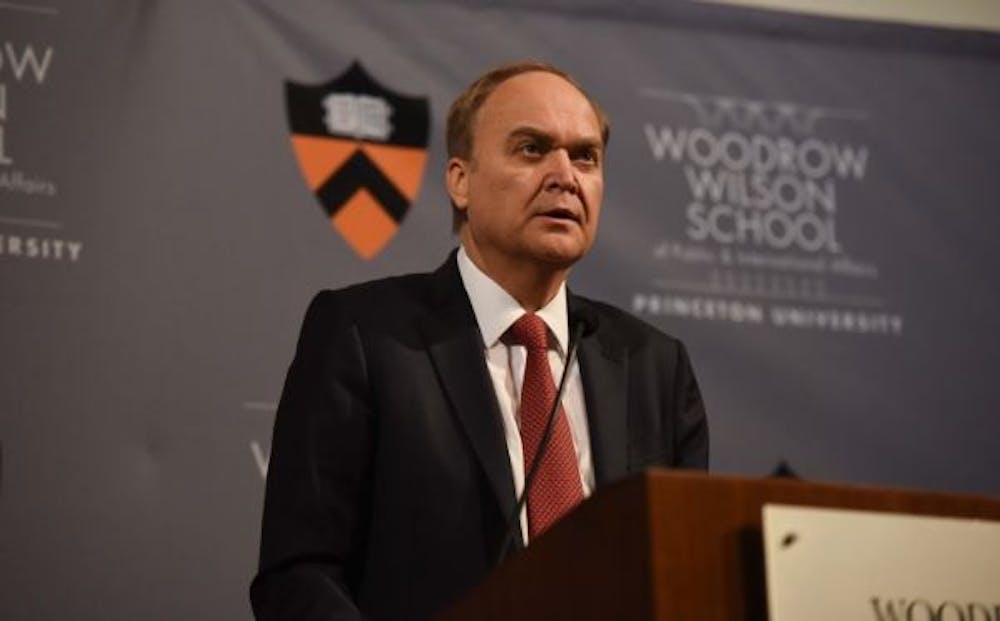Speaking to a full house, Anatoly Ivanovich Antonov, the Russian Ambassador to the United States, asserted that Russia is not an enemy of the United States. The ambassador focused on strategic partnerships, such as nuclear disarmament, manned space exploration, and information sharing between intelligence services during his talk.
He emphasized that the United States and Russia are two nations whose interests do not necessarily conflict, but mutual lack of dialogue and discussion has so far prevented the two countries from resolving crises such as the ongoing war in Syria or the rumored violations of arms limitations treaties.
Antonov explained that Russia wants to be seen as a power on equal footing with the United States, rather than as an obedient state to a single superpower.
Antonov noted that Russia’s relations with the United States have historically been positive. Empress Catherine the Great had supported the American Revolution and the Union during the Civil War, while millions of Soviet soldiers fought and died alongside the United States during the Second World War.
“Russia-U.S. relations cannot stay on the decline forever,” Antonov said. “We are ready for such negotiations.”
From the U.S. perspective, panelist Bruce Blair pointed out that Russia is considerably isolated from the West — the country is under heavy sanction for violations of various international treaties and has a considerably smaller GDP than the United States.
Bruce Blair was one of two panelists at the discussion. He is a nuclear security expert at the Program on Science and Global Security at the Wilson School. Anna Makanju, the second panelist, is a lecturer in international affairs at the Wilson School.
“Success depends on the ability to build coalitions,” Blair said. “Where does Russia stand on building trust?”
Antonov responded by urging dialogue between the United States and Russia as equal partners, such that both sides can inspect and are aware of each other’s nuclear arsenals. Nuclear cooperation and arms limitation between the United States and Russia, who together hold approximately 95 percent of the world’s nuclear arms, are central to global security, explained Antonov.
“Both sides understand a nuclear war cannot be won, therefore should not be fought,” Antonov said. “Limiting weapons of mass destruction is a high priority.”
Antonov also recommended opening more channels of communication between diplomats as well as mutually reaffirming commitments from both nations to nuclear disarmament treaties like the Intermediate-Range Nuclear Forces treaty (INF) and New Strategic Arms Reduction Treaty.
The United States has recently threatened to withdraw from the INF, a move that has drawn considerable criticism from both the Kremlin and nuclear security advisors.

Panelist Makanju asked Antonov about the propagation of “fake news” and pointed out that Russian media such as RT, a Russian international television network, had repeatedly featured anti-American content, which created anti-American hysteria that she had not seen since the Cold War. For reference, Anna Makanju was born in Saint Petersburg (then Leningrad), Russia.
Antonov asserted that fake news comes from a lack of dialogue and government officials meeting in person. He asserted support for the 2+2 model, in which the defense and foreign ministers of both countries meet to maintain direct dialogue between high echelons of each government.
On the subject of the recent incident in the Kerch Strait, in which three Ukrainian navy ships were captured by the Russian Border Guard earlier this week, Antonov stated, “How should our sovereignty be protected from violations? Our border guards protected Russian sovereignty professionally.”
When asked by a student about how Russia’s foreign policy objective in the Middle East conflicts with that of the United States, Antonov mentioned that U.S.-Russian cooperation was very difficult to establish.
“I have failed to persuade my American colleagues on military cooperation,” said Antonov.
For instance, Antonov explained, there is no mutual policy to save downed pilots. He added that it is crucial that the United States and Russia work together in their common goal of fighting terrorism.
The lecture, entitled “A Discussion with Amb. Anatoly Ivanovich Antonov, Ambassador of Russia to the United States,” was sponsored by the Program in Russian, East European and Eurasian Studies and the Program on Science and Global Security. The panel was held yesterday in the Arthur Lewis Auditorium at 4:30 p.m. and was moderated by Michael Reynolds, the director of the program in Russian, East European, and Eurasian Studies and an associate professor of Near Eastern Studies.








